

The 16 Most Popular Scholarship Essay and Application Questions
by Gabrielle McCormick | Nov 17, 2018 | Applying for Scholarships , Finding Scholarships , Scholarship Essays | 0 comments

Believe it or not, scholarship committees generally ask the same types of questions and have similar applications.
That’s right! The scholarships you find are going to fit into specific themes which you must be able to identify in order to save your family time, frustration, stress, and most importantly – money.
The 16 themes below are designed for you to use as a reference until you can spot them on your own. Also, make sure you check out our Scholarship Fast Track videos , specifically the Application Accelerators Module , that outlines these scholarship essay themes and questions even more!
The Top 16 Scholarship Essay Themes
- Committee Composition
- Competition
- Contribution
- Credentials
I’ve provided a definition as well as common scholarship question examples for each theme.
[info-box type=”success”] Real Talk: These questions are not made-up and, in fact, come from actual scholarship applications that are open to students at all levels. I hope that they serve you well in preparing for your upcoming applications. [/info-box]
Common Scholarship Questions and Essay Prompts
Scholarship essay theme: career.
The career theme is pretty self-explanatory. The committee wants to know any and everything relating to you or your student’s career goals.
Common Scholarship Questions:
- What do you want to do after you graduate from college?
- Why did you select this career?
- How will you change the field/industry?
- Where do you see yourself 10 years from now?
Scholarship Essay Theme: Catch-All
This is a student’s life summary or autobiography which usually includes information about the past, present, and future. Some committees refer to it as a personal statement or brief bio. (Warning: Not all personal statements will be looking for a life summary. Make sure you read the application carefully.)
- Please write a short autobiography including information about your family, work experience, community involvement, hobbies, spare time activities, and what you hope to do in the future.
- Please include a short summary or personal statement describing your accomplishments and goals.
- List any honors and awards you’ve received.
- List your extra-curricular activities.
Scholarship Essay Theme: Challenges
Everyone loves a good underdog story. An essay theme that focuses on Challenges asks the student to identify a time when they were down or faced conflict. The committee wants to hear how instead of giving up, you rose to the occasion or at least learned what was necessary to achieve success.
- Write a short essay that describes areas in your life where you demonstrated leadership and overcame obstacles either through your school, social, or family life.
- What’s the most difficult challenge you’ve ever faced? How did you handle it?
Scholarship Essay Theme: Champion
Why you? Out of all the available applicants, why should you or your student earn the scholarship?
- Why do you need this scholarship?
- Please list any additional comments you believe would be helpful in the committee’s decision.
- In 100 words or less, tell why you would like to receive the XYZ scholarship.
Scholarship Essay Theme: Change
This is one I’m starting to see more and more of in the scholarship world. Committees are interested in the opinions, thoughts, and ideas of applicants. With topics like legislation, population control, and the environment, committees want to see analytical and critical thinking skills.
- What do you think we should do about gun control in this country?
- How would you handle texting and driving?
- Create an innovative solution to reduce waste.
Scholarship Essay Theme: Character
As Defined by Merriam-Webster , “Character is the way someone thinks, feels, and behaves .” Essentially, it’s what makes you who you are.
- Describe a time in your life that has shaped who you are as a person.
- This is what I believe in…
- How do you define success?
- What traits do you possess that will enhance your education or future career?
Scholarship Essay Theme: Classroom
Academics, teaching methods, assignments, and anything that pertains to student learning fall under this category.
- How has technology impacted student learning?
- If you could design a college curriculum, what would it be?
- Do you believe that standardized testing has helped or hindered student learning?
Scholarship Essay Theme: College
This is one of the most common scholarship essay themes. The premise: Why do you want to go to college?
You’ll often see this theme attached to others as an additional question or a required component of the application.
- Why do you want to go to college?
- What do you expect to gain from earning a college degree?
- What are your educational goals?
Is this helping you? Are you beginning to see how this can save you a lot of time? If so, let me know in the comments below, Tweet Me @ScholarshipTalk, or just share the following message and I’ll know you see the benefits of organizing your scholarships based on themes. ?
[clickToTweet tweet=”Organizing my scholarships based on the 16 core essay themes has saved me time! #OwnYourDegree” quote=”Organizing my scholarships based on the 16 core essay themes has saved me time!”]
Scholarship Essay Theme: Committee Composition
I’m sure you’ve seen some of the eccentric scholarships out there that challenge you to write about your favorite ice cream, talk about using their product, or design a logo for their company. These scholarships tend to be unique or inspired by the sponsoring organization.
- Create a greeting card and be featured in our upcoming holiday card collection.
- Design a mascot for our company.
- Write an essay about how lights and fixtures could impact your mood.
- Develop an innovative video to end smoking.
Scholarship Essay Theme: Community
This is also a popular scholarship theme. Instead of looking at a student’s GPA, test scores, or major, the community essay theme focuses on community service, community initiatives, and community improvement.
- Describe a meaningful volunteer experience?
- Make thank-you cards for military service members.
- Share a project you developed to change your community.
Scholarship Essay Theme: Competition
A common theme for athletes, band members, dancers, or those involved in groups/organizations is the Competition scholarship essay. It highlights participation and its associated benefits.
- What does it mean to be a good student on the field, in the classroom, and in the community?
- Define what it means to be a good teammate?
- Describe a moment of sportsmanship.
Scholarship Essay Theme: Contribution
Again, this is another scholarship essay theme that you may see added to another scholarship question or application. The committee wants to know about you or your student’s contribution to society at various levels.
- How will you make a difference in our world?
- How have you made a difference in your community?
- What do you think our country should do to foster unity?
Scholarship Essay Theme: Control
Control , i.e. leadership, oftentimes stands alone as a scholarship theme because of the many questions that can be asked. From being a leader to follower and everything in between, the committee is seeking answers regarding group interaction, the organization of people, or participation within a group setting.
- What does leadership mean to you?
- Explain a family, social or school situation, in which your leadership made the difference. What was accomplished?
Scholarship Essay Theme: Creative
I’m starting to see a rise in Creativ e scholarship essays as well. You may notice some similarities with the Committee Composition theme because these scholarships are usually committee-driven and created.
The committee will provide a question, but give you freedom in depicting or representing the theme or category they’ve selected.
- Write a short story of 2,000 words or less.
- Create a video of 2-minutes or less to encourage young people to stop texting and driving.
- Submit a photograph depicting the word “family”.
Scholarship Essay Theme: Credentials
As defined by Merriam-Webster , “Credentials are a qualification, achievement, personal quality, or aspect of a person’s background, typically when used to indicate that they are suitable for something.”
These scholarships will require specific credentials to apply or may use the credential within application questions.
- To apply for this scholarship, you must be a female student majoring in a male-dominated industry. Please tell us why you selected this career?
- Applicants must be a member of the LGBTQI community. Describe a volunteering activity you conducted for your community.
- Students must be a dependent of an active military member or veteran. Why do you need this scholarship?
- Students applying for this scholarship must be undergraduate students entering their first semester. What study habits do you think are imperative to freshmen student success?
Scholarship Essay Theme: Culture
Cultures can be comprised of many different components. From college communities to hometown traditions, the Culture theme is based on the defining characteristics of a student’s environment.
- Tell the committee why you decided to attend college out-of-state?
- What does your university’s tradition and pride represent?
- Submit a piece of artwork that captures your town.
[info-box type=”alert”]Do you want a downloadable version of these themes and questions for your notes? Click here for a FREE copy . [/info-box]
Save a Ton of Time by Using These Themes
Scholarship applications may have one or several themes present. Focus on identifying your possible scholarship themes.
Labeling scholarships by themes and working on them at the same time allows the student to divide and conquer. If your family can get good at identifying themes, you’ll immediately save hours of time on applications .
As I start to see new themes emerge, I’ll be sure to add them to the list. For now, this should keep you pretty busy as you continue to find and apply for scholarships.
How can we help?
Stay connected .
Free Webinar
COVID-19 and Scholarships
The scholarship process is being influened by COVID-19.
Make sure your family is prepared and protected. Register today.
Scholarship Topics
Access additional information resources and tools, speak with a scholarship coach schedule a session, join our private community facebook group, need tech take advantage of your si dell discount.

Click Here to Speak with a Dedicated Dell Account Manager!
Popular Blog Posts
Financial Aid
20 Important Questions for Financial Aid
Scholarship Planning
How Many Scholarships Should You Be Applying For?
Scholarship Scams
How to Spot and Avoid the Most Common Scholarship Scams
Winning Essay Tips
Why the Scholarship Committee Hated Your Essay
Increase Your Chances
JOIN SCHOLARSHIP EDGE
Step-by-Step Help from a Scholarship Winner
Winning tools, templates, and examples, get help when you're stuck from a scholarship coach.

Enjoying this blog post?
Then you'll love our newsletter! Subscribe to Scholarship Informer Weekly for exclusive content and updates.
You're Subscribed!
Have a language expert improve your writing
Check your paper for plagiarism in 10 minutes, generate your apa citations for free.
- Knowledge Base
- College essay
- How to Write a Scholarship Essay | Template & Example
How to Write a Scholarship Essay | Template & Example
Published on October 11, 2021 by Kirsten Courault . Revised on May 31, 2023.
A good scholarship essay demonstrates the scholarship organization’s values while directly addressing the prompt. If you plan ahead , you can save time by writing one essay for multiple prompts with similar questions.
Table of contents
Apply for a wide variety of scholarships, make a scholarship tracker spreadsheet, tailor your essay to the organization and the prompt, write a focused and relevant personal story, scholarship essay example, other interesting articles, frequently asked questions about college application essays.
Scholarships are a type of student financial aid that don’t require repayment. They are awarded based on various factors, including academic merit, financial need, intended major, personal background, or activities and interests.
Like college applications, scholarship applications often require students to submit their grades, standardized test scores, letters of recommendation, and an essay.
A scholarship essay shares your values and qualities in the context of a specific question, such as “How does technology affect your daily life?” or “Who has had the greatest impact on your life?”
Be wary of scholarship scams
While some applications may not require an essay, be wary of scholarship scams that do the following:
- Guarantee you scholarship money for a fee
- Claim scholarship information is exclusive to their company
- Ask for your bank or credit card information to hold the scholarship
Some legitimate companies do charge for releasing comprehensive scholarship lists or creating a tailored list of scholarship opportunities based on your profile.
However, you can always discover scholarship opportunities for free through your school counselor, community network, or an online search.
Many students focus on well-known, large scholarship opportunities, which are usually very competitive. To maximize your chance of success, invest time in applying for a wide variety of scholarships: national and local, as well as big and small award amounts. There are also scholarships for international students .
In addition to charitable foundation and corporate scholarships, you should consider applying for institutional scholarships at your prospective universities, which can award money based on your application’s strength, your financial situation, and your demonstrated interest in the school.
Check with your guidance counselor, local organizations, community network, or prospective schools’ financial aid offices for scholarship opportunities. It’s a good idea to start applying as early as your junior year and continue throughout your senior year.
Choose the right scholarships for you
Choose scholarships with missions and essay topics that match your background, experiences, and interests. If the scholarship topic is meaningful to you, it will be easier for you to write an authentic and compelling essay.
Don’t shy away from applying for local scholarships with small dollar amounts. Even a few hundred dollars can help you pay for books.
Local scholarships may be more tailored to your community, background, and activities, so they’re likely more relevant to you. Fewer students apply for these scholarships, so you have less competition and a higher chance of success.
Some places to look for local scholarships include
- Civic organizations, such as the Rotary Club, Lions Club, etc.
- Your church, mosque, synagogue, or place of worship
- Community groups, such as the YMCA
- Ethnicity-based organizations
- Your local library or local small businesses
- Organizations related to your intended major
- Your city or town
- Your school district
- Unions, such as SEIU, the Teamsters, CWA, etc.
- Your employer or your parents’ employers
- Banks, credit unions, and local financial institutions
Prevent plagiarism. Run a free check.
While researching scholarship opportunities, create a scholarship tracker spreadsheet to keep track of the following:
- Scholarship amounts
- Required application materials
You can use our free Google Sheets template to track your scholarship applications.
Scholarship application tracker template
You can also include scholarship essay prompts in your college essay tracker sheet . By grouping or color-code overlapping essay prompts, you can plan to write a single essay for multiple scholarships. Sometimes, you can also reuse or adapt your main college essay .
Even if you’re adapting another essay, it’s important to make sure your essay directly addresses the prompt, stays within the word count limit , and demonstrates the organization’s values. The scholarship committee will be able to tell if you reuse an essay that doesn’t quite respond to the prompt, so be sure to tailor it to the questions asked.
Research each organization
Before writing, research the scholarship organization’s mission and reason for awarding the scholarship. Learning more about the organization can help you select an appropriate topic and relevant story.
While you should tailor your essay to the organization’s values, maintain your authentic voice. Never use false or exaggerated stories. If the organization’s values don’t align with yours or you can’t brainstorm a relevant story for the scholarship, continue searching for other scholarship opportunities to find a more appropriate one for you.
After researching the organization, identify a specific personal experience that embodies its values and exemplifies why you will be a successful student.
Choose a story with the following criteria:
- Responds to the prompt
- Demonstrates the organization’s values
- Includes an authentic story
- Focuses on you and your experience, not someone else’s
A good scholarship essay is not
- A resume of your achievements
- A lengthy opinion piece about the essay topic
- An essay featuring a negative tone that puts down others
If appropriate, you can briefly address how the scholarship money will help you achieve your educational goals. You should also end with a brief thank-you.
Take a look at the full essay example below. Hover over the underlined parts to read explanations of why they work.
Prompt: Describe how working for Chelsea’s Chicken restaurant has developed leadership skills that will help you succeed in college. Give specific examples of leadership characteristics that you have exhibited during your employment with us.
As a nervous 16-year-old, I walked into Chelsea’s Chicken for my first day of work determined to make enough money to put gas in my car and buy pizza on the weekends. My only previous job was mowing my neighbors’ lawns when they were on vacation, so I had no idea what to expect. I was a bit intimidated by my new responsibilities, especially handling money and helping disgruntled customers.
However, it didn’t take me long to learn my way around the cash register and successfully address customer complaints. One day, Roger, the store manager, asked me if I wanted to join Chelsea’s Chicken Leadership Training Initiative. He said he saw leadership potential in me because of my attitude with the customers and my enthusiasm for learning new job responsibilities. It surprised me because I had never thought of myself as a leader, but I quickly agreed, and Roger handed me a three-ring binder that was thicker than my math and science textbooks put together! He told me to take it home and read over it during the following week.
In that binder, I discovered that being a leader means taking the initiative, especially when the job is undesirable. One week later, I got to practice that idea when a little kid threw up in the bathroom and missed the toilet. It smelled terrible, but I stepped forward and told Roger that I would clean it up. My coworkers thought I was crazy, but I started to believe in my leadership potential.
That night as we closed the store, Roger pulled me aside in the parking lot and told me that he could tell that I had been studying the manual. He wanted to give me more responsibility, along with a dollar-per-hour pay raise. I was surprised because I had been working there for only a couple of months, but his encouragement helped me make a connection: good leadership helps other people, and it often is rewarded. I was determined to experience more of both.
Within a month, I was ready to take the Team Leader exam, which mattered because I would receive a promotion and a much bigger raise if I passed. But, when I got to work, two of the scheduled team members had called in sick. We were noticeably short-handed, and our customers weren’t happy about it.
I walked back to the lockers, put on my vest and hat, and took my place behind an open register. Customers immediately moved into my line to place their orders. Roger looked at me with surprise and asked, “Did you forget that you’re testing tonight?” I responded, “No, sir—but what’s the use of taking a leadership test if you aren’t going to lead in real life?” Roger smiled at me and nodded.
He stayed late that night after we closed so that I could leave early and still take the test. I noticed that Roger was always staying late, helping employees learn new skills. His example taught me that leaders take the initiative to develop other leaders. He gave me a clear picture of what shared leadership looks like, making room for others to grow and excel. When I asked him where he learned to do that, he said, “From the same leadership manual I gave you!”
Chelsea’s Chicken has offered me so much more than a paycheck. Because of Roger’s example, I have learned to take the initiative to care for my family and friends, such as being the first to do the dishes without my mom asking or volunteering to pick up my friend for our SAT prep course. Now, as I prepare to enter college, I have confidence in my leadership ability. I know I’m signing up for a challenging major—Biology, Pre-Med—yet I also know that Chelsea’s Chicken has helped me to develop the perseverance required to complete my studies successfully.
If you want to know more about academic writing , effective communication , or parts of speech , make sure to check out some of our other articles with explanations and examples.
Academic writing
- Writing process
- Transition words
- Passive voice
- Paraphrasing
Communication
- How to end an email
- Ms, mrs, miss
- How to start an email
- I hope this email finds you well
- Hope you are doing well
Parts of speech
- Personal pronouns
- Conjunctions
A scholarship essay requires you to demonstrate your values and qualities while answering the prompt’s specific question.
After researching the scholarship organization, identify a personal experience that embodies its values and exemplifies how you will be a successful student.
Invest time in applying for various scholarships , especially local ones with small dollar amounts, which are likely easier to win and more reflective of your background and interests. It will be easier for you to write an authentic and compelling essay if the scholarship topic is meaningful to you.
You can find scholarships through your school counselor, community network, or an internet search.
You can start applying for scholarships as early as your junior year. Continue applying throughout your senior year.
Yes, but make sure your essay directly addresses the prompt, respects the word count , and demonstrates the organization’s values.
If you plan ahead, you can save time by writing one scholarship essay for multiple prompts with similar questions. In a scholarship tracker spreadsheet, you can group or color-code overlapping essay prompts; then, write a single essay for multiple scholarships. Sometimes, you can even reuse or adapt your main college essay .
Cite this Scribbr article
If you want to cite this source, you can copy and paste the citation or click the “Cite this Scribbr article” button to automatically add the citation to our free Citation Generator.
Courault, K. (2023, May 31). How to Write a Scholarship Essay | Template & Example. Scribbr. Retrieved April 2, 2024, from https://www.scribbr.com/college-essay/scholarship-essay/
Is this article helpful?

Kirsten Courault
Other students also liked, how to apply for college | timeline, templates & checklist, how to research and write a "why this college" essay, us college essay tips for international students, unlimited academic ai-proofreading.
✔ Document error-free in 5minutes ✔ Unlimited document corrections ✔ Specialized in correcting academic texts
- Link to facebook
- Link to linkedin
- Link to twitter
- Link to youtube
- Writing Tips
How to Write a Scholarship Essay (With Examples)

- 6-minute read
- 22nd August 2022
Writing a scholarship essay can seem like a daunting task. For many students , higher education isn’t possible without financial aid, and scholarships are especially valuable because the money awarded doesn’t have to be paid back.
Even though the stakes are high, there are a few manageable steps you can take to ensure you write a great essay to submit with your scholarship applications. We have a few top tips to help you get started, along with writing examples to demonstrate some key points. Check out our guide below to learn more.
A scholarship essay is a great opportunity to present yourself and your accomplishments in an impactful way. It is, therefore, essential to be aware of each scholarship deadline so you can allow sufficient time for the writing process, which typically includes the following:
· Read the essay prompt and brainstorm ideas.
· Create an outline covering the key points you want to address.
· Write a draft and seek feedback from trusted teachers, family, or friends.
· Make any necessary revisions and proofread before submitting your final draft.
Scholarship review committees will be able to tell if you rushed through your essay, so give yourself the best chance of winning an award by staying organized and on schedule!
Who and What?
Researching the scholarship provider and diligently reviewing the essay prompts can help you write an essay that makes you stand out as a top candidate.
1. Who are you writing to?
Learn more about the organization offering the scholarship and why the scholarship fund was created.
For instance, a scholarship may honor its organization’s founder, and the founder’s qualities (e.g., integrity, good citizenship, and leadership) might be the same values guiding the scholarship program as a way to continue the founder’s legacy.
If you identify with any of the same qualities, you can incorporate those keywords into your essay to demonstrate your shared values. Remember to remain authentic, though!
2. What are you writing about?
You must read the essay prompt carefully to identify precisely what you need to accomplish with your essay.
Some prompts ask about your career goals and how you plan to achieve them or your achievements and the challenges you overcame to reach them.
You’ll write about common topics across multiple scholarship applications – some may even be similar to your college admission essay – so you can repurpose your essays as long as you’re diligent about tailoring each one to its prompt.
Your application will likely require other items such as transcripts and test scores, but the essay is your chance to offer something entirely unique. Write about key experiences that highlight who you are and what you’ve accomplished, or you could mention something you’re passionate about.
Remember to follow any specific instructions regarding length and formatting, and be sure to answer all questions listed in the prompt. It can hurt your chances if you’re unable to show the committee that you’re detail-oriented and can follow directions.
Structuring Your Essay
Your essay should follow a standard format that includes a clear beginning, middle, and end. Typically, you should:
· Establish your main idea in the introduction.
· Include a separate body paragraph for each key point that supports your main idea.
· Draw it all together and revisit your main idea in the conclusion.
Scholarship committees read thousands of essays each year. And often, there are hundreds of applicants for an award that can only go to a select few candidates. Writing a powerful introduction and conclusion gives you a chance to make a lasting impression.
1. Introduction
Write an introduction that hooks the reader and encourages them to stay engaged till the end of your essay. Don’t be afraid to add personal, tangible details and an anecdote .
Find this useful?
Subscribe to our newsletter and get writing tips from our editors straight to your inbox.
For example, if you’re writing about your career goals, demonstrate why you’ve chosen that career:
It was the biggest game of the season, and the stands were packed despite the bitter cold. My heart was beating louder than all of the cheers, and I was filled with the anticipation that one more run into the end zone would give us the championship. Everything went silent during that run when the tackle shattered both my leg and my dreams.
My world has always revolved around being an athlete – until one day it couldn’t. I spent many frustrating months rehabilitating, but I got through it because of my dedicated physical therapist, who helped me recover both physically and mentally after a devastating loss. And it was that profound experience that led me to pursue a career in the exercise sciences.
2. Conclusion
The conclusion is the last thing your reader will see, so it’s another opportunity for you to make your essay memorable.
Rather than summarizing with a general statement such as “this is why you should award me a scholarship,” perhaps explain what the financial assistance will help you achieve:
My parents never had the opportunity to go to college, and neither did their parents. I watched them work hard every day just to make ends meet, and I often questioned whether I could achieve anything more. Nevertheless, I spent four years working as hard as I saw my parents work, and I beat the odds by getting accepted to college. A scholarship could be invaluable for me, as it would allow me to attend and be successful without having to worry about finances.
Persuasive Writing
While you don’t want your scholarship essay to be overly informal, you’re certainly allowed to add some creativity and personal details to help persuade your readers.
One of the best ways to do so is by writing with the modes of persuasion ; that is, ethos, pathos, and logos.
Demonstrate your credibility. Use your real-life experiences and interesting details to establish, for example, how you’ve contributed to your community:
I saw how much bullying was impacting so many students at my school, so I founded my high school’s first anti-bullying club and organized campaigns to bring attention to the harm that people can cause one another.
Evoke an emotional response. The “show, don’t tell ” writing technique, which involves using descriptive words when discussing actions and emotions, can be especially useful here:
During one of our first awareness assemblies, the theater was completely silent as I read aloud anonymous stories from students about the scars bullying had left on their lives. Tears were stinging in my eyes as I described the struggles my classmates were facing, but I persevered to give a voice to those who didn’t have one.
Convey your point with reason and facts. Use statistics to demonstrate what you’ve accomplished:
In the first year alone, our club improved students’ feelings of safety and acceptance at our school by 53%.
Proofreading and Editing
Don’t forget the importance of proofreading your essay, as spelling and grammar mistakes can leave a bad impression on your reader. Our expert editors can help ensure your writing is clear, concise, and error-free. Give yourself a better chance at impressing scholarship committees by submitting a free trial document today!
Share this article:
Post A New Comment
Got content that needs a quick turnaround? Let us polish your work. Explore our editorial business services.
3-minute read
What Is a Content Editor?
Are you interested in learning more about the role of a content editor and the...
4-minute read
The Benefits of Using an Online Proofreading Service
Proofreading is important to ensure your writing is clear and concise for your readers. Whether...
2-minute read
6 Online AI Presentation Maker Tools
Creating presentations can be time-consuming and frustrating. Trying to construct a visually appealing and informative...
What Is Market Research?
No matter your industry, conducting market research helps you keep up to date with shifting...
8 Press Release Distribution Services for Your Business
In a world where you need to stand out, press releases are key to being...
How to Get a Patent
In the United States, the US Patent and Trademarks Office issues patents. In the United...

Make sure your writing is the best it can be with our expert English proofreading and editing.
What are Scholarship Essay Prompts & Questions?

Of all the hardships, finding the right scholarship essay prompts is the toughest one. Essay prompts are the questions or statements that prompt you to answer them in appropriate logic. These research questions are used across all the academic landscape thus providing the answer to the college committee on student’s creativity. College essay prompts provide a thought-provoking question that must be answered by students. In short, by answering this short statement in your essays, students can showcase their eligibility and skills to win a scholarship case.
Don’t worry if you are finding this topic indigestible, today our essay-writing specialists will help you sort out things. In this blog, we will dissect this topic for thorough evaluation and nullify all the assumptions, thus promoting only logical reasoning. Let’s get down to it!
Table of Contents
20+ Amazing Colleges Scholarship Prompts
Here we will present the amazing and astounding college essay prompts that will help you plead your case move forward. Have a look!
- Describe a person you admire.
- Why do you want to attend this school?
- What is a significant experience you’ve had, and what impact did it have on you?
- Describe a problem you’ve solved or a problem you’d like to solve.
- Discuss an accomplishment, event, or realization that sparked a period of personal growth and a new understanding of yourself or others.
- Reflect on a time when you questioned or challenged a belief or idea. What prompted your thinking? What was the outcome?
- Describe a topic, idea, or concept you find so engaging that it makes you lose track of time.
- Share an essay on any topic of your choice. It can be one you’ve already written, one that responds to a different prompt, or one of your own design.
- Discuss the challenges and rewards of making your contribution.
- Has there been a time when you’ve had a long-cherished or accepted belief challenged? How did you respond? How did the challenge affect your beliefs?
- What is the hardest part of being a teenager now? What’s the best part? What advice would you give a younger sibling or friend (assuming they would listen to you)?
- Submit an essay on a topic of your choice.
- Describe a time when you made a meaningful contribution to others in which the greater good was your focus. Discuss the challenges and rewards of making your contribution.
- What do you want admissions officers to know about you that is hard to communicate through the application?
- Reflect on your engagement with a community to which you belong. How do you feel you have contributed to this community?
- If you could change one thing about your high school, what would it be and why?
- How has your family history, culture, or environment influenced who you are?
- If you could go back in time what would you change about your life?
- If you were given the ability to change one moment in your life, would you do so? Why or why not? If so, what moment would you change and why?
- Presume the reader of the essay has never met you before. By the end of the essay, what three words would they use to describe you?
- If you had the chance to have a 30-minute conversation with any person in human history (either living or deceased), who would be the person you choose? Why? What topics would you discuss with this person?
- Select a creative work — a novel, a film, a poem, a musical piece, a painting or other work of art — that has influenced the way you view the world and the way you view yourself.
- Discuss an issue that is significant to you and how your college experience could help you address it.
- Tell us about something that is meaningful to you and why.
- If there’s anything else that is important for us to know about you but didn’t find a question or place in the application to tell us, now’s your chance.
Remember, these are just scholarship prompts and it’s important for your essay to be unique and personal. You can make them more creative and flexible to your challenges and requirements.
50+ General Scholarship Essay Topics
Finding a suitable essay topic for your scholarship application is tricky for many learners. It has been observed that students make poor choices when it comes to getting it right. Hence, finding, using and explaining your purpose of scholarship application is pertinent to picking the right topic. Here are the best topics we have curated for your after a lengthy brainstorming:
- The impact of COVID-19 on global education
- Climate change: myth or reality?
- The role of social media in modern politics
- The future of artificial intelligence
- The ethical implications of genetic engineering
- The influence of pop culture on society
- The effects of poverty on mental health
- The importance of mental health awareness in schools
- The role of women in STEM fields
- The impact of technology on interpersonal communication
- The pros and cons of online learning
- The influence of video games on youth behavior
- The effects of music therapy on mental health
- The role of the United Nations in maintaining world peace
- The impact of immigration on the economy
- The influence of the #MeToo movement on workplace culture
- The future of space exploration
- The effects of deforestation on biodiversity
- The role of cryptocurrency in the global economy
- The impact of veganism on the environment
- The influence of mindfulness meditation on stress reduction
- The future of renewable energy sources
- The effects of overpopulation on resources consumption
- The role of artificial intelligence in healthcare
- The impact of fast fashion on the environment
- Cybersecurity in the age of digital transformation
- Mental health issues among college students
- Impact of globalization on local cultures
- Influence of parental involvement on academic achievement
- Role of diet and exercise in managing chronic diseases
- Challenges faced by international students in a foreign country
- Impact of climate change on agriculture and food security
- Influence of advertising on consumer behavior
- Role of technology in enhancing learning outcomes in classrooms
- Impact of social media on body image and self-esteem
- Importance of financial literacy among college students
- Influence of childhood experiences on adult personality traits
- Role of sports in promoting physical and mental health among youth
- Impact of political instability on economic development in a country
- Influence of peer pressure on adolescent behavior
- Role of teachers in shaping students’ character and values
- Impact of drug abuse on individual health and societal fabric
- Influence of celebrity culture on youth aspirations and identity formation
- Role of community service in fostering empathy and civic responsibility among youth
- Impact of sleep deprivation on cognitive function and academic performance
- Influence of family structure (nuclear vs joint family) on child development
- The Role of Artificial Intelligence in Modern Scientific Research: Discuss how AI is revolutionizing various fields of science, from data analysis to prediction models.
- Climate Change and the Science of Global Warming : Explore the scientific evidence supporting climate change and discuss the technologies being developed to combat it.
- The Impact of Quantum Computing on Future Technologies: Discuss the potential implications of quantum computing in fields like cryptography, optimization, and simulation.
- Genetic Engineering and the Future of Medicine: Discuss the ethical and scientific challenges and possibilities in the field of genetic engineering.
- Space Exploration and Technological Advancements: Discuss how advancements in technology have fueled our exploration of space.
- Nanotechnology in Medicine: Explore the potential applications and implications of nanotechnology in medical science.
- The Science Behind Renewable Energy Technologies: Discuss the scientific principles behind different types of renewable energy sources like solar, wind, and hydroelectric power.
- The Role of Science in Understanding Mental Health: Discuss how scientific research has contributed to our understanding of mental health conditions and their treatment.
- The Impact of Scientific Developments on Society: Discuss how scientific developments have shaped society throughout history.
- The Future of Robotics and Automation: Explore how advancements in robotics and automation could impact various sectors like manufacturing, healthcare, and transportation.
We have provided just like we promised. These scholarship topics will amaze the scholarship selection committee of any prestigious university. It’s up to you to make the maximum out of these topics and impress your professors.
10 Most Popular Scholarship Questions
One of the tough work is getting through the application process for scholarship is answering all the questions asked by panelists. Here we will present the 10 most asked questions that will help you prepare yourself prior to commencing the essay writing process.
- Could you provide us with a brief overview of your personal and academic background?
- How would this scholarship contribute to your educational journey and future aspirations?
- Could you share an instance where you encountered failure and the lessons you derived from that experience?
- Can you describe a significant contribution you have made to your local community?
- What are your academic or professional objectives for the future?
- Can you recount an occasion where you assumed a leadership role and the impact it had?
- Who has been the most influential figure or source of inspiration in your life, and why?
- What motivates your desire to pursue higher education?
- How do you plan to finance your college education?
- Why do you believe you are a deserving candidate for this scholarship?
These top 10 questions are the ones typically asked in every application essay for scholarship or admission. Some universities have adopted a new approach that’s more dynamic and based on psychoanalysis. Still these examples will help you curtain out missing details and answer these queries wisely.
How to Address Scholarship Essay Prompts?
Scholarship essay prompts encourage critical thinking and brainstorming among students. It’s one of the best ways to develop argumentative skills in yourself. Here’s how you can address the prompts accurately with sufficient details and perfection.
Share your Story
The first thing an essay prompt asks from the students is to share their storyline. You can start with information such as your first dog, cat or an animal. Additionally, students can also add their first achievement such as top achievement in the class or sports club etc. By sharing your story, it offers an introspective view of your personality. This step helps you win a scholarship application for higher education.
Describe a Person you Admire
When writing an essay about a person you admire, it’s important to structure your thoughts and ideas in a coherent manner. Here’s a simple guide:
Introduction : Start by introducing the person you admire. Mention their name, what they do, and why they are significant to you. This sets the stage for the reader.
Body : This is where you delve into details. Discuss their qualities, achievements, and characteristics that you admire. Use specific examples or anecdotes to illustrate these points. For instance, if the person is a public figure, you could mention their contributions to society. If it’s someone you know personally, you could talk about instances where they’ve impacted your life.
Conclusion : Summarize why this person is worthy of admiration. Reflect on their influence on you and others.
Tell About a Contribution to your Community
Scholarship prompts that focus on answering the questions of tangible effects of a student’s community service can be approached in the following manner:
Introduction : Start by introducing yourself and the community you’re a part of. Briefly mention the contribution you’ve made.
Background : Provide some background information about your community. This could include its location, size, culture, and any unique characteristics it has.
Your Contribution : This is the main body of your essay. Describe in detail the contribution you’ve made to your community. This could be volunteering at a local charity, organizing community events, or any other activities that have had a positive impact on your community.
Impact : Discuss the impact of your contribution. How has it benefited your community? Has it solved a problem or improved a situation? Use specific examples to illustrate this.
Reflection : Reflect on what this contribution means to you. How has it affected you personally? Has it changed your perspective or taught you something new?
Conclusion : Summarize your points and reiterate the importance of community involvement. You could also mention any future contributions you plan to make.
What are your Academic and Career Goals?
Students are required to answer their goals for the future such as in academics and career wise. These goals help your assessors to determine whether you’re a fit or suitable candidate for this worthy scholarship or not;
Educational Objectives :
The educational goals a student must show or possess are given below. If you’re in sixes and sevens over this, read them and guide your ship in the right direction.
Pinpoint your objectives: Contemplate your desired achievements, the abilities you aspire to acquire, and the relationships you aim to establish at the university.
Establish attainable and realistic objectives : Educators can offer a framework to assist students in setting educational objectives that are feasible, suitable, and attainable.
Develop a regular study schedule : Determine your study times and establish a goal for each study session to aid in achieving your overall educational objective. Evade procrastination and establish a favorable study atmosphere.
Regularly reassess and modify your objectives : The practice of setting goals, coupled with regular reflection and modification of these goals, can equip students with self-regulated learning tools for fostering an academic growth mindset.
Professional Objectives:
Professional goals depict what a student will pursue after completing their studies. It’s not necessary that education completion will lead to immediate hirings. However, it shows the inclination of students into a particular field. Here’s how you can demonstrate your career choosing goals:
Envision success: Elite performers condition themselves to visualize their objectives immediately prior to a contest. This technique can be applied in various scenarios, whether you’re preparing for a job interview or strategizing your next career step.
Break down professional objectives into manageable steps: Initially, pinpoint your ultimate objective and then divide it into smaller actionable steps.
Formulate specific yet adaptable professional objectives : Professional objectives should be specific but also allow enough flexibility for course correction when necessary.
Enhance performance: Consider setting an objective to boost your job performance, including your productivity and efficiency.
Pursue an internship at a company you respect: Internships offer practical experience and enable you to experience the work environment of the career you’re interested in.
How will this Scholarship Help You?
When explaining how a scholarship will help you, it’s important to consider several key points:
Financial Support: Scholarships provide financial assistance, reducing the burden of educational expenses such as tuition, books, and housing. This can allow you to focus more on your studies instead of worrying about financial issues.
Educational Opportunities: Scholarships can open doors to educational opportunities that might otherwise be inaccessible due to financial constraints. This could include studying at a prestigious institution or pursuing a specific course of study.
Career Advancement: Many scholarships offer networking opportunities and internships that can lead to job offers post-graduation. They can also enhance your resume, as they are seen as a testament to your abilities and dedication.
Personal Growth: Being awarded a scholarship can boost your confidence and validate your hard work and dedication. It can also motivate you to continue excelling in your academic pursuits.
Remember, when writing about how a scholarship will help you, it’s important to personalize your response. Share your specific goals, challenges, and how the scholarship will assist in overcoming those challenges and achieving your goals. It’s not just about the financial aspect; it’s about how the scholarship will contribute to your overall growth and future success.
Tell Us About a Time You Failed and What You Learned From It?
Although every student has their subjective opinion when it comes to failure and coping with it. Many students have experienced fight or flight phenomena when it comes to failures. For better understanding how to respond on such questions, here’s a mock example for taking a fruitful lesson from it:
“In my previous role as a project manager, there was a time when I failed to deliver a project on time. The project was complex and required coordination across multiple teams. Despite my best efforts to keep everything on track, unexpected challenges arose that caused delays.
The failure was a tough pill to swallow, but it taught me valuable lessons. I learned the importance of contingency planning and risk management. I realized that while it’s crucial to be optimistic about project timelines, it’s equally important to anticipate potential obstacles and have backup plans in place.
Since then, I’ve incorporated these lessons into my work. I now spend more time during the planning phase of each project, identifying potential risks and preparing for them. This approach has significantly improved my project delivery times and reduced last-minute surprises.”
Remember, the key to answering other scholarship questions is to show that you’re capable of learning and growing from your mistakes. It’s not about the failure itself, but what you did afterward that counts. It shows resilience, determination, and a willingness to learn – qualities that are highly valued in any role.
Final Thoughts
Scholarship essay prompts help the student’s assessment board understand their mind under a certain hypothetical scenario. These prompts and question statements also guide students to think critically and offer solutions relative to their understanding. All in all, it’s imperative for scholarship seekers to thoroughly read and understand the prompts and then answer them. We do provide comprehensive answers on this topic. For any ambiguity ask your professors to guide and prepare you for better knowledge on successfully completing these steps.
Order Original Papers & Essays
Your First Custom Paper Sample is on Us!
Timely Deliveries
No Plagiarism & AI
100% Refund
Try Our Free Paper Writing Service
Related blogs.

Connections with Writers and support
Privacy and Confidentiality Guarantee
Average Quality Score
This website uses cookies to provide you with the most relevant information. Please accept cookies for better performance. Read more »
- How It Works
- Annotated Bibliography
- Article Critique
- Article Review
- Research Papers
- Blog Content
- Book Report
- Business Plan
- Book Review
- Research Proposal
- Interview Essay
- Outline Online
- Dissertation
- Marketing Plan
- Capstone Project
- Discussion Board Post
- Editing Services
- Elite Essay Writing
- Excel Homework
- Math Problem
- Grant Proposal
- Literary Analysis
- Literature Review
- Movie Critique
- PowerPoint Presentation
- Article Writing Service
- Proofreading
- Formatting Services
- Questions & Answers Essay
- Movie Review
- Response/Reaction Paper
- White Paper
- Motivation Letter
- Speech Paper
- Professional Letter
- Questionnaire
- Scholarship Essay
- Business Report
- Thesis Proposal
- Problem Solving
- Concept Map
- VIP Writing Services
Scholarship Essay Topics
As an undergraduate student, you certainly know the difficulty earning scholarship points. However, with our bright scholarship essay topics, you will easily forget about your troubles. Now you can learn how to write a scholarship essay . You can also learn how to best follow the required scholarship essay format. So, if you are in dire straits of academic writing and don’t know how to start a scholarship essay, our topics will save you from troubles. We understand that few students are lucky to receive research grants or obtain scholarship from the university of their dreams. However, no one says that you cannot accomplish the same task! Time has come for you to become a real success. Use our 25 scholarship paper topics to improve your scholarship chances and pursue an excellent academic career.
Check Your Price
Activate my 15% discount on 1st order
25 Unmatched Topics for a Scholarship Essay
- How did I become a dedicated and passionate student? What experiences have persuaded me that I have to continue my education?
- How I became a school policymaker and changed the atmosphere in my classroom, making it more favorable for learning (you can use this topic to build your scholarship essay prompts and later transform them into a top notch essay).
- How I graduated from college, while living beyond the poverty line.
- How I became a school entrepreneur and earned my first $1,000.
- How I decided to devote a year of my life to traveling and exposed myself to a diversity of unique cultures around the globe.
- How I left my comfort zone and started a new life at the edge of success.
- Why scholarships are unfair to students but why they still need them to become a success in life.
- Why modern students have considerable college debts and whether scholarship is the best solution to students’ financial problems.
- Growing up in a military family, I realized the value of discipline early in life. Now I am ready to use the learning provided by my family to succeed in my college studies.
- I have accumulated vast experiences, while being a foreign volunteer. However, I still believe that the whole life is ahead of me.
- I am certain that every person should have a dream, no matter how impossible it may seem. It is dreaming that motivates us to move forward and achieve the most ambitious goals (writing a scholarship essay can be a revelation for any applicant, who chooses this topic).
- Why I believe that my decision to go to college will help resolve some of the most pressing global issues (this is one of the most difficult scholarship essay topics on this list).
- Who were my role models and how did they influence my life?
- How struggling to find a full-time job has taught me to be particularly selective in my career and academic decisions.
- How being in foster care gave me a unique opportunity to live a full life.
- Why I decided to become a foreign volunteer and why I think most students are not suitable for this kind of activity.
- Why I believe my parents to be the key driver behind my academic and career successes.
- Why I am certain that being a military person is desirable and important for everyone (if you like this topic but don’t know where to start, ask Writer-Elite.com for help).
- Why I think I would never become a volunteer in my profession. The hidden dangers of volunteering and its global promise to future generations.
- How winning scholarship will empower me to fight financial and gender discrimination in our society.
- How being a nurse has changed my perceptions of the world.
- What in my opinion is the most important thing about diversity and why it benefits college students.
- Why do I want to become a nurse researcher? Why not mathematics or physics?
- How I found myself being actively involved in scientific research and why I can no longer imagine my life without it.
- How being a scientist can become an eye-opening experience and why everyone has equal chances to succeed in science disciplines.
FREE TRAINING: How I Secured 6-Figures in Scholarships & Graduated Debt-Free
The Scholarship System
Paying for college begins here
10 Common Scholarship Essay Questions and How to Answer Them
Scholarships & Financial Aid
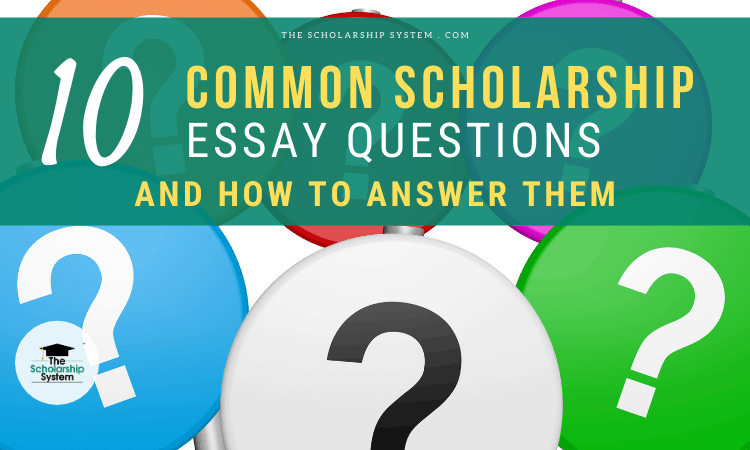
Updated on July 15th, 2022
When your student applies for scholarships, writing the essay often feels like the most challenging part. Luckily, it doesn’t have to be. By learning about common scholarship essay questions and how to answer them, your student can be prepared for most of the topics they’ll need to address.

Knowing how to answer common scholarship essay questions is only part of the battle. You also have to track down great scholarships to pay for college. If you and your student want to learn more about exciting scholarship opportunities, sign up for our free college scholarship webinar ! Just head to http://thescholarshipsystem.com/freewebinar and reserve your spot today .
If your student wants to get ahead of the curve and write winning scholarship essays , here’s a look at ten common scholarship essay questions and how to tackle them.
- 1.1 1. Tell Us About Yourself
- 1.2 2. How Will This Scholarship Make a Difference for You?
- 1.3 3. Can You Tell Us About a Time You Failed? What Did You Learn from That Experience?
- 1.4 4. Tell Us About a Contribution You’ve Made to Your Community
- 1.5 5. What Are Your Academic (or Professional) Goals?
- 1.6 6. Tell Us About a Time Where You Stepped Up as a Leader
- 1.7 7. Who Has Been Your Biggest Influence (or Inspiration)?
- 1.8 8. Why Do You Want to Go to College?
- 1.9 9. How Are You Planning on Financing Your College Education?
- 1.10 10. Why Do You Deserve This Scholarship?
- 2 Using Common Scholarship Essay Questions to Prepare
1. Tell Us About Yourself
This is possibly one of the trickiest college scholarship essays to write, not because it’s complicated, but because it’s so broad. Students have a lot of freedom with this prompt, so it’s easy to become overwhelmed about how to proceed.
Typically, students shouldn’t just give an overview of their life stories. Instead, they need to provide the committee with insights about their passions and drives, events that shaped their perspective, and relevant successes or achievements.
It’s also wise to be a bit future-focused, discussing not just where they’ve been but where they hope to go. Students can touch on valuable personality traits along the way, too, as that helps the reader gauge who they are as a person.
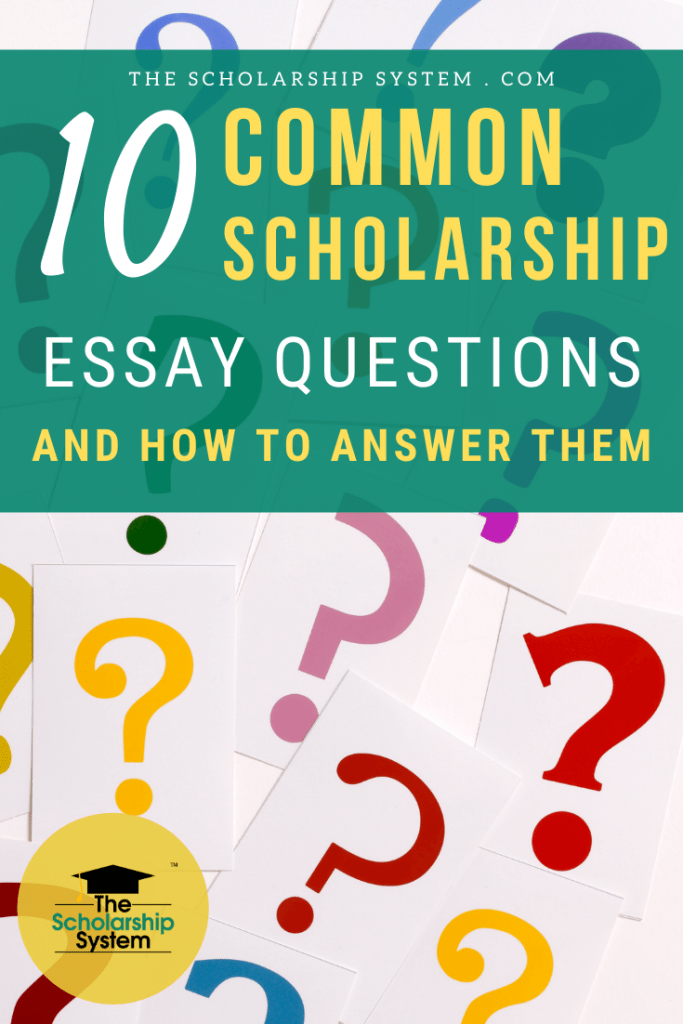
2. How Will This Scholarship Make a Difference for You?
Generally, students have a few options for addressing this question. First, they could showcase how the scholarship helps them overcome a relevant financial hardship. This can include being able to afford tuition, get needed equipment or supplies, or access a program at a college that may otherwise be out of reach.
Second, they could concentrate on how the scholarship will help them achieve their academic or professional goals. For example, your student might want to discuss how the award would allow them to pursue their preferred field.
Students should focus on how the scholarship eliminates roadblocks, though the exact type of obstacle can vary. Additionally, they should discuss what they’ll be able to achieve if they receive the award, both in the short- and long-term.
3. Can You Tell Us About a Time You Failed? What Did You Learn from That Experience?
For many students, even figuring out how to start a scholarship essay introduction for this topic is hard, let alone writing the whole thing. It’s difficult discussing a failure with others, so many students hold back if they are given this prompt.
However, honesty is the best policy. Additionally, even when talking about a failure, it’s possible to keep the essay positive.
Students should start by outlining the scenario and giving an overview of how the failure occurred. The misstep can be academic, personal, or professional, as long as it’s clear that something went wrong along the way.
After the overview, it’s all about a quick pivot. Students should explain the lessons they learned and what they would do differently if faced with a similar situation again. That helps them demonstrate their self-awareness and growth, along with their ability to persevere.


4. Tell Us About a Contribution You’ve Made to Your Community
This scholarship essay prompt is incredibly common for volunteering scholarships or awards focused on service. Students need to share insights about their community service-oriented activities, as well as the positive impact created by their participation.
Additionally, it’s smart for students to spend some time explaining how the experience impacted them. They may also want to touch on any plans they have to continue to remain active in their community, as that can help them stand out.
5. What Are Your Academic (or Professional) Goals?
With this common scholarship essay question, students need to clearly outline what they want to achieve, either academically or professionally, depending on exactly what they are asked. Usually, it’s best to start off with the basics. Students should explain what they want to study or the career path they hope to have.
However, they shouldn’t stop there. It’s also wise to dig a bit deeper, diving into precisely what motivated them to head in this direction. Some students do this by sharing their epiphany moment, while others talk about how it’s the culmination of a life-long passion. As long as it paints a great picture, any approach is potentially a winner.

6. Tell Us About a Time Where You Stepped Up as a Leader
Leadership is a hot topic for college scholarship essays. Many committees ask questions like this one to see what applicants bring to the table. Usually, your student needs to provide a clear example of when they took on a leadership role.
There are a lot of options for approaching this. Heading up a school project counts, as well as captaining a sports team. Coordinating volunteer efforts may work, along with a wide variety of work-related activities.
Again, exactly what your student chooses is less important than how they describe it. It’s all about sharing a story, ensuring the reader can get a good gauge on what happened and how your student’s involvement made a difference.
7. Who Has Been Your Biggest Influence (or Inspiration)?
Many scholarship essay questions want students to talk about their heroes. While it may seem odd to ask students to discuss someone other than themselves, it’s actually a great way to learn more about an applicant’s passions.
As they describe why the person influenced or inspired them, they incidentally talk about how they are motivated, their priorities, and their values. It also allows the reader to learn more about what shaped your student’s goals and aspirations, which can be quite enlightening.
Ideally, students want to be story-oriented. While they can certainly discuss the person’s traits and background, the focus should largely be on moments that inspired or influenced their way of thinking. That makes the essay more meaningful.

8. Why Do You Want to Go to College?
For some students, this question is surprisingly tough. Many students saw college as a must from a relatively young age, essentially viewing it as anything as optional. However, students do have choices about how they move forward after high school.
Scholarship committees want to know that heading to college isn’t an afterthought or something a student is doing solely because they were pressured in that direction. Ideally, students should discuss personal motivations or goals that made college the right choice for them. That way, their passion can shine through.
9. How Are You Planning on Financing Your College Education?
If a scholarship is focused on financial need, your student may face questions about how they intend to fund their education. This can be a difficult topic, particularly for students who may not be able to afford school without outside support, such as scholarships or grants. It’s hard to talk about financial hardship, but this question makes it necessary.
Students should actually start their essay by giving the committee insight into their situation, particularly regarding personal or household circumstances that make affording college difficult. After the overview, students should outline all of their efforts to secure enough funding. That can include everything from applying to scholarships, exploring work-study, getting a part-time job, or anything else.
Often, scholarship committees appreciate it when students are taking every chance to find ways to pay for college. It lets them know that the student is passionate enough to go the extra mile and demonstrates that they aren’t afraid of challenges if it means achieving their goals. So, students should touch on everything they are doing to make their college dream possible.

10. Why Do You Deserve This Scholarship?
Writing an essay about why they deserve a scholarship can be hard for any student. However, it’s a topic they need to be ready to discuss. This is one of the most common scholarship essay questions around.
Previously, The Scholarship System took a deep dive into how to write an essay on “Why I deserve this scholarship,” making that a great resource for any student who wants to prepare. As an overview, it’s about showcasing their perspective without coming across as arrogant and discussing achievements (academic or otherwise) that highlight why they are a standout applicant.
Using Common Scholarship Essay Questions to Prepare
Simply knowing what the common scholarship essay questions are usually isn’t enough. Instead, students should take extra steps to prepare to write their essays.
First, it’s wise to spend a little time brainstorming about the topics. That way, students can develop several ideas that they may want to explore and see if one approach resonates more than another.
Second, checking out some scholarship essay examples that won money is an excellent idea. This helps students learn more about what scholarship committees connect with, as well as more about how to tackle certain topics.
Finally, it’s wise to learn more about essay writing techniques. Along with reviewing how to write scholarship essays , it doesn’t hurt to research college personal statements , as those can be very similar to scholarship (and college application) essays. Similarly, checking out scholarship essay formats is a smart move. It will help your student figure out how to start a scholarship essay introduction, how to end a scholarship essay, and everything in between.
By doing that additional research, they’ll have as much information as possible. And, in the end, that could increase the odds that their essay will be a winner.
Related Videos:
- 7 College Scholarship Essay Ideas to Win More Funding
- How to Reuse Scholarship Essays & Win Over and Over

- Pinterest 363
March 9, 2021 at 6:35 am
Thanks for sharing this nice piece of information i personally believe scholarships are very improtant for every student
Leave a Reply Cancel reply
Your email address will not be published. Required fields are marked *
Save my name, email, and website in this browser for the next time I comment.
Subscribe via email
Popular posts, how to write winning scholarship essays, how to write an amazing scholarship resume, 75 easy ways to save money in college.

setscholars.org
learn how to set up your scholarship essay without any trouble
29 Great Scholarship Essay Topics & Popular Questions
Going through each scholarship application’s essay topics and questions can get cumbersome. However, it gets easier if you can access common essay topics and popular scholarship questions. Then, you can reuse them repeatedly as you apply for more scholarships.
This article will supply common scholarship essay questions that you can start with. You can prepare an essay already on any one of these prompts and use them across multiple scholarships.
Scholarship Application Questions
There are diverse questions a scholarship committee can ask applicants. It would help if you brainstormed several subject ideas; you might come across one you did not consider before.
Sometimes, a scholarship board gives you scholarship essay questions; how you answer those questions matters. You should know what answers they expect and what information they don’t need from you.
6 College Scholarship Essay Questions:
- How do you believe this scholarship will help you achieve your goals?
- Have you contributed anything to your community: How?
- What are the innate or developed qualities that make you unique?
- What field of study are you going into?
- What are your career or academic goals?
- Why should we award you this scholarship position?
5 Other Scholarship Questions Examples:
- Have you ever had a moment of revelation where you’ve had your eyes opened to things you were otherwise blind to?
- If your friends were to write an essay about you, how would they characterize you?
- What dreams do you have; if you look back in 30 years, what do you hope to have achieved?
- How did you develop the attribute, quality, or skill that distinguishes you from everybody else?
- Do you typically have unwavering beliefs or philosophy: What are they?
Scholarship Essay Prompts
These are questions scholarship providers ask to decide whether an applicant deserves the scholarship or not. The way you answer scholarship essay prompts is important because you are selling yourself to the board. When answering scholarship essay prompts, you want to establish that you are high-achieving and well-deserving of the scholarship.
6 Scholarship Essay Prompt Examples:
- Write a short autobiography of yourself telling us about your work experience, family, hobbies, and future plans.
- Talk to us about a time you failed and the lessons you took from it.
- Tell us ways sports have impacted your life, positively or negatively.
- Tell us why we should award you this scholarship out of thousands of others.
- Tell us about a time a belief or idea of yours was challenged, how you reacted, and the result.
- Write a short essay telling us areas in your life, school, social, or family, where you demonstrated a leadership skill that helped you overcome an obstacle.
Scholarship Essay Topics
The scholarship application process also involves essay topics being given to the applicant. This is where an applicant gets to showcase his strength, personality, and abilities in a way that’ll compel the board. This part of the application process can be the most persuasive; therefore, you should put your all into it. Applicants are advised to have 5 to 7 pre-written essays, which can be used across different scholarship applications.
6 Popular Scholarship Essay Topics:
- Traits That Will Enhance My Education and Future Employments
- Innate/Developed Leadership Qualities That Make Me Unique
- A Book That Inspired Me Greatly
- 10 Things I have Accomplished in Life
- Why I Believe I Deserve This Scholarship Award
- Awards and Honorable Titles I Have Received
Scholarship Essay Titles
Scholarship essay prompts may require that applicants come up with titles. However, applicants sometimes find it hard to come with scholarship essay titles. Below are some ideas on scholarship essay titles that you can use to land that scholarship award.
6 Scholarship Essay Titles:
- The Person Who Challenged and Changed My Beliefs
- Goals I Plan to Achieve in 10 Years
- My Dreams and Aspirations
- Issues I Have Resolved in My Family With My Innate Leadership Skills
- What I Consider to Be My Biggest Success Yet
- Things And People That Inspire Me
In conclusion, you shouldn’t wait until you land a scholarship award before writing a scholarship topic. There are many suggestions on scholarship essay questions online, including those listed here. You should choose at least five and write on them and have professionals vet and correct them for you. As such, when the scholarship opportunity arrives, you are ready – and your chance of getting it is high!

Published by admin
View all posts by admin
Leave a Reply Cancel reply
Your email address will not be published. Required fields are marked *
Looking to publish? Meet your dream editor, designer and marketer on Reedsy.
Find the perfect editor for your next book
1 million authors trust the professionals on Reedsy. Come meet them.
Best Writing Scholarships in 2024
Showing 159 scholarships that match your search.
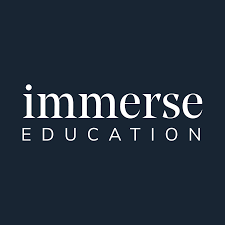
Immerse Education
The Immerse Education Essay Competition provides the opportunity for students aged 13-18 to submit essay responses to a pre-set question relating to their chosen subject. 10 winners will receive a 100% scholarship, with runner-up prizes also awarded. 100% Scholarship Award For Cambridge, Oxford, Sydney & London Summer School Essay Competition.
Categories: Critical Essay
Organization: Immerse Education.
Deadline: January 04, 2025.
Additional awards: Runner-ups: 50% of scholarship.
Categories: Critical Essay.
Apply now →
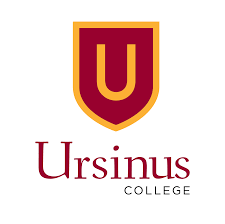
Creative Writing Award
The winner will be offered the opportunity to occupy during her or his first academic year the residence room where J. D. Salinger lived; and Leadership standing in the Ursinus writing community. The winner will be expected to join the previous award winners in reading subsequent creative portfolios, and will help the Office of Admission in selecting the next winner. Award winners are also expected to be prominent members of Ursinus’ Literary Society, The Lantern, and the creative writing community.
Categories: Critical Essay, Journalism, Nonfiction, Novel Writing, Personal Essay, Playwriting, Poetry, Portfolio, Research, Screenwriting, and Short Fiction
Organization: Ursinus College.
Deadline: January 15, 2025.
Categories: Critical Essay, Journalism, Nonfiction, Novel Writing, Personal Essay, Playwriting, Poetry, Portfolio, Research, Screenwriting, and Short Fiction.
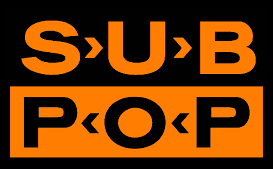
The Sub Pop Loser Scholarship
Sub Pop Records is extremely proud to offer a grand total of $15,000 in college scholarship money to three eligible high school seniors. To apply you must submit a one-page essay using any combination of our questions as a guide (or write something completely your own, be inspired and creative!). Applicants must be residents of Washington or Oregon in pursuit of higher education.
Categories: Personal Essay
Organization: Sub Pop Records.
Deadline: March 23, 2025.
Additional awards: Second place scholarship of $5,000, third place scholarship of $3,000.
Categories: Personal Essay.

Islamic Scholarship Fund Program
Students who are Muslim or active members of the Muslim community may apply for the Islamic Scholarship Fund. The ISF awards multiple scholarships each year ranging from $3,000-$10,000, though the amounts and number of recipients will vary. Students must submit applications including essay questions, work samples, and letters of recommendation, and must also be majoring in an ISF-supported field related to media or politics.
Organization: Islamic Scholarship Fund.
Deadline: March 21, 2025.
Additional awards: Multiple awards of varying amounts will be given.

BBB Torch Talk Scholarship
BBB Foundation is a 501(c)3 organization dedicated to educating consumers on a variety of marketplace issues; this scholarship is in pursuit of that goal. Applicants must attend high school in Alaska, Hawaii, Idaho, Montana, Oregon, Washington or Western Wyoming, and will submit a 500-word essay for BBB’s online magazine Torch Talk on one of the given topics.
Organization: Better Business Bureau.
Deadline: March 16, 2025.

Flag House Scholarship Award
Do you know of an unsung history-maker in your community? Is there an organization in your community working to keep the legacy of a historically significant, but often overlooked, individual alive and relevant? Identify a person living or from the past whose professional work, activism, or personal story has made a significant impact on you or your community. Describe why their story is unique and explain how they have changed history. Response should be limited to 350 words.
Categories: Research and Critical Essay
Organization: The Star-Spangled Banner Flag House.
Deadline: March 26, 2025.
Categories: Research and Critical Essay.
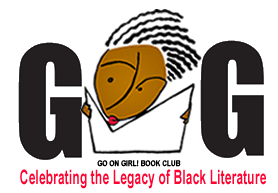
Unpublished Writer's Award
The winner of this award receives $1,000, an invitation to accept the award at our annual awards ceremony, promotion on our website, and a feature of their work in our Magajournal and quarterly newsletter. Applicant must email an original, unpublished fiction work (short story or novel excerpt) not to exceed 2,000 typed words on double-spaced pages
Categories: Short Fiction and Novel Writing
Organization: Go On Girl! Book Club.
Deadline: March 31, 2025.
Additional awards: Invitation to awards ceremony, promotion through website and publications.
Categories: Short Fiction and Novel Writing.
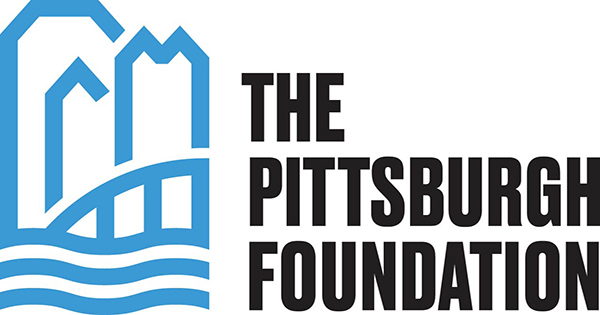
Marguerite Young Endowment Fund
The Marguerite Young Endowment Fund was established at The Pittsburgh Foundation to provide scholarships for students who plan to study theology. Candidates must be attending a Protestant seminary as a master of Divinity candidate, preparing for full-time ministry and/or be a seminary intern at a Protestant Church. Application must includes proof of this, as well as a personal essay.
Organization: The Pittsburgh Foundation.

Incight Scholarship
The INCIGHT scholarship is open to students in Washington, Oregon, and California who have a documented disability. Applicants must complete two detailed essay responses (video essays also welcome) in order to be eligible. The number of awards and total amount awarded will be determined during the selection process, and winners will be notified in June.
Organization: INCIGHT.
Deadline: April 01, 2025.

Christine B. Dexter Scholarship
The Christine B. Dexter Scholarship was established in honor of Christine B. Dexter after her passing from stomach cancer in 2008. This scholarship awards undergrad students a $2,000 scholarship towards their fall tuition. All recipients demonstrate a history of community service and resilience through their cancer journey.
Organization: Christine B. Foundation.

The AAF-Greater Evansville Scholarship
The AAF-Greater Evansville awards scholarships to deserving high school and/or college students yearly in April. To be eligible, students must plan to pursue a career in advertising, marketing, public relations or graphic design. Application varies yearly but includes various education details and personal statements.
Categories: Journalism
Organization: American Advertising Federation of Greater Evansville.
Categories: Journalism.
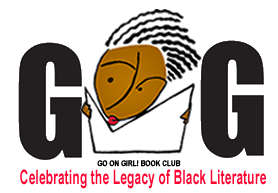
Aspiring Literary Scholar Award
The winner of this award receives $1,000, an invitation to accept the award at our annual awards ceremony, promotion on our website, and a feature of their work in our Magajournal and quarterly newsletter. Candidate must submit an essay not to exceed 800 words on the topic "The Power of The Written Word."

Dr. Jerry Pournelle Scholarship
The Dr. Jerry Pournelle Scholarship may be awarded to a candidate of any gender majoring in engineering, math, biological or physical sciences, or “science fiction as literature” as an eligible field of study. Applicants must submit a 500-1,000 word essay on one of several scientific topics.
Categories: Research, Personal Essay, and Critical Essay
Organization: The Heinlein Society.
Categories: Research, Personal Essay, and Critical Essay.

Dr. Yoji Kondo Scholarship
The Dr. Yoji Kondo Scholarship may be awarded to a candidate of any gender majoring in engineering, math, biological or physical sciences, or “science fiction as literature” as an eligible field of study. Applicants must submit a 500-1,000 word essay on one of several scientific topics.

Jack & Julie Narcolepsy Scholarship
Project Sleep’s Jack & Julie Narcolepsy Scholarship is a national scholarship program to support students with narcolepsy and idiopathic hypersomnia. Students must complete an application form that includes a response to the esssay question: "If you could go back in time and speak to yourself on the day you were diagnosed, what would you say? Write a letter to yourself on that day."
Organization: Project Sleep.
What are writing scholarships?
Writing scholarships are financial awards given to students based primarily on written work, though other factors are usually taken into consideration as well. Most writing scholarships involve a prompt or series of prompts to which applicants must respond. Some writing scholarships — especially those that award large amounts of money — require applicants to submit past writing samples, or even a full portfolio.
The good news is that, with so many writing scholarships to choose from, you don’t have to apply for any that are “out of your league.” Indeed, though most students have heard of writing scholarships, you may not realize just how many different varieties there are! Here are five of the most common types of writing scholarships, all of which you can find in this directory.
1. Personal essay scholarships
Personal essay scholarships involve writing on a topic related to your own experience. You’ll often see personal essay prompts like, “How have your experiences influenced your choice of major?” and “What are your career aspirations and how do you plan to achieve them?” Other prompts may ask you to write about a role model, a life-changing event, an aspect of your identity, etc. Suggested length is usually about 500-1,000 words, but varies depending on the level of detail requested and how many essay questions are provided.
Just about every scholarship these days has a personal essay component of some kind. This is because personal essay responses both demonstrate writing skills and give the judges a clear sense of each applicant’s goals. No one wants to throw away money on an aimless student — so if you’re applying for a personal essay scholarship, make sure to convey both your writing abilities and your ambitions in your work!
2. Critical essay scholarships
Critical essay scholarships are more in line with what students might consider “academic” essays. The prompts typically ask applicants to analyze works of literature. However, unlike open-ended English class essays, most critical essay scholarships provide a very specific prompt (e.g. “Examine The Great Gatsby in the context of its World War II-era revival”).
Critical essay scholarships can also involve non-literary subject matter. Some may ask applicants to evaluate a historical event or figure; others may ask them to defend their stance on a political or legal issue. Though the line between critical and personal essays can sometimes blur, for the purposes of this directory, we define critical essays as those that use evidence from an external source to prove a point.
3. Short fiction scholarships
Short fiction scholarships include scholarships for short stories, one-act plays, poetry, and any other form of fiction that isn’t a novel or full-length script. Short fiction scholarships tend to be easier to find than long-form fiction scholarships, since most judging panels don’t have time to read more than a few thousand words per entry. Therefore, if you write fiction and you’re hoping to nab yourself a scholarship, this category is the way to go! (That said, if you’re a hardline novelist, some places will accept a sample chapter or two as short fiction entries.)
4. Journalism scholarships
Journalism scholarships are for students interested in pursuing a career in news, magazine, and/or online journalism. These scholarship applications almost always ask for writing samples to show the candidate’s interest. Depending on the organization, they may prefer topical news reports, informative articles, thinkpieces, or a mix. Some journalism scholarships provide a prompt and ask applicants to write a new article, but the focus is usually on samples. Speaking of which…
5. Portfolio scholarships
Portfolio scholarships are the most rigorous kind of writing scholarship, requiring a substantial body of work from each applicant — usually 5-10 pieces of writing, if not more. The upside is that awards for portfolio scholarships tend to be pretty sizable, and may even cover your entire tuition!
If you decide to apply to a portfolio scholarship, make sure you have several strong pieces of work in your oeuvre, and consider writing a few new pieces as well. What you shouldn’t do is rush through a dozen new pieces to throw together as a portfolio. If you don’t have samples at the ready from previous assignments or projects, you’ll be better off applying to a less intensive writing scholarship.
Why apply to writing scholarships?
Applying to writing scholarships is a huge undertaking, especially if you’re pursuing multiple scholarships at once. It can sometimes feel like the effort isn’t worth it, or that you have little chance of actually winning any awards. But in truth, submitting to writing scholarships is one of the best investments you can make in your education, your creative writing skills, and your professional life.
Scholarships for larger amounts do attract more applicants, but that doesn’t mean they’re impossible to land — only that you have to work a little harder to stand out. And you can definitely sway the odds in your favor by applying to lots of small scholarships ($500 or less) for which you’ll have fewer competitors. Remember that every little bit helps! For example, if you plan on taking out student loans, even a $500 scholarship could save you much more in interest down the line.
Another compelling reason to apply to writing scholarships is that oftentimes, you’ve already done the work, or the work required is minimal. For scholarships that require writing samples, you’ll simply submit what you’ve already written in the past — and even for scholarships with specific prompts, you rarely have to write more than a couple of pages. If you were seriously committed, you could apply to a scholarship every day, spending a single concentrated evening on each application.
Jumping off that thought, as English majors love to say: the more writing scholarships you apply for, the better a writer you’ll become. Writing tons of scholarship essays will make you a much more creative and efficient writer. Not only will this help with your personal writing projects, but it will also be invaluable to your education and even your career! Writing is a crucial skill for every major — you’ll always have to write papers and emails to professors, after all — and even if you don’t plan to pursue a writing-based job, you'll still need writing skills to polish your résumé.
Finally, remember that there’s a writing scholarship out there for everyone, no matter what your interests or intended field. This directory includes plenty of creative writing scholarships, yes; but there are also personal essay scholarships for future doctors, lawyers, salespeople, and so much more. You have nothing to lose by giving it a shot, so why not start searching for your dream writing scholarship today? (And if you’re unsure about your writing skills, you might benefit from some of the resources below.)
Resources to strengthen your writing skills
- 20 Writing Tips to Help You Become A Better Writer Today
- How to Stop Procrastinating and Build A Solid Writing Routine
- What is Creative Nonfiction? Memoirs, Literary Journalism, and More!
- How to Write a Memoir: Tell Your Amazing Story in 9 Steps
- How to Write a Fantastic Short Story In 7 Steps
- How to Self-Edit Your Manuscript Like a Pro
- 700+ Creative Writing Prompts to Inspire You
- 100+ Creative Writing Exercises for Authors
Join a community of over 1 million authors
Reedsy is more than just a blog. Become a member today to discover how we can help you publish a beautiful book.

Save your shortlist
Enter your email address to save your shortlist so that you don't lose it!
By continuing, you will also receive Reedsy's weekly publishing tips and access to our free webinars.

We sent over your shortlist. Thank you for using Reedsy's Writing Scholarships Directory, happy publishing! 🙌
Bring your stories to life
Our free writing app lets you set writing goals and track your progress, so you can finally write that book!

1 million authors trust the professionals on Reedsy. Come meet them.
Enter your email or get started with a social account:
- Commercial Insights
- Wealth Insights
- Online Banking Login
- Regions Total Wealth
- Investment Account Access
- Open an Account
- En Español

Regions Riding Forward® Scholarship Contest

Their Story. Your Voice.
Your voice is your own. But it's also been impacted by others. Who, we wonder, has inspired you? Let us know by entering the Regions Riding Forward Scholarship Contest.
You could win an $8,000 college scholarship
For the opportunity to win an $8,000 scholarship, submit a video or written essay about an individual you know personally (who lives in your community) who has inspired you and helped you build the confidence you need to achieve your goals.

The details
The 2024 Regions Riding Forward Scholarship Contest consists of four (4) separate Quarterly Contests - one for each calendar quarter of 2024. Regions is awarding four $8,000 scholarships through each Quarterly Contest.
Each Quarterly Contest has its own separate entry period, as provided in the chart below.
The entry deadline for each Quarterly Contest is 11:59:59 PM Central Time on the applicable Quarterly Contest period end date (set forth in the chart above).
No purchase or banking relationship required.
Regions believes in supporting the students whose passion and actions every day will continue to make stories worth sharing. That’s why we have awarded over $1 million in total scholarships to high school and college students.
How to enter, 1. complete an online quarterly contest application.
Enter the Regions Riding Forward Scholarship Contest by completing a Quarterly Contest application. The second Quarterly Contest runs from April 1, 2024 through June 30, 2024. Complete and save all requested information.
2. Prepare your Written Essay or Video Essay
For each Quarterly Contest, the topic of your Written Essay or Video Essay (your “Essay Topic”) must be an individual you know personally, who lives in your community. Your Written Essay or Video Essay must address how the individual you have selected as your Essay Topic has inspired you and helped you build the confidence you need to achieve your goals.
Written Essay and Video Essay submissions must meet all of the requirements described in the contest Official Rules. Your Written Essay or Video Essay must be (i) in English, (ii) your own original work, created solely by you (and without the use of any means of artificial intelligence (“AI”)), and (iii) the exclusive property of you alone.
Written Essays must be 500 words or less. You can write your Written Essay directly in the application, or you can copy and paste it into the appropriate area in the application form.
Video Essay submissions must be directly uploaded to the contest application site. Video Essays must be no more than 3 minutes in length and no larger than 1 GB. Only the following file formats are accepted: MP4, MPG, MOV, AVI, and WMV. Video Essays must not contain music of any kind nor display any illegal, explicit, or inappropriate material, and Video Essays must not be password protected or require a log-in/sign-in to view. You must upload your Video Essay to the application, and you may not submit your Video Essay in DVD or other physical form. (Video Essays submitted via mail will not be reviewed or returned.)
Tips to Record Quality Videos on a Smartphone:
- Don’t shoot vertical video. Computer monitors have landscape-oriented displays, so shoot your video horizontally.
- Use a tripod. Even small movements can make a big difference when editing.
- Don’t use zoom. If you need to get a close shot of the subject, move closer as zooming can cause pixilation.
- Use natural lighting. Smartphone lighting can wash out your video.
3. Review and submit your Quarterly Contest application
Review your information on your Quarterly Application (and check the spelling of a Written Essay) and submit your entry by 11:59:59 p.m. Central Time on the applicable Quarterly Contest period end date. The second Quarterly Contest period end date is June 30, 2024.
4. Await notification
Winning entries are selected by an independent panel of judges who are not affiliated with Regions. If your entry is selected as a Quarterly Contest winner, you will need to respond to ISTS with the required information.
Eligibility
For purposes of this contest:
- The “Eligible States” are defined as the following states: Alabama, Arkansas, Florida, Georgia, Iowa, Illinois, Indiana, Kentucky, Louisiana, Mississippi, Missouri, North Carolina, South Carolina, Tennessee and Texas.
- An “accredited college” is defined as a nonprofit, two- or four-year college or university located within one of the fifty (50) United States or the District of Columbia.
To be eligible to enter this contest and to win an award in a Quarterly Contest, at the time of entry, you must:
- Be a legal U.S. resident of one of the Eligible States.
- Be age 16 or older.
- Have at least one (1) year (or at least 18 semester hours) remaining before college graduation.
- If you are not yet in college, begin your freshman year of college no later than the start of the 2025 – 2026 college academic school year.
- As of your most recent school enrollment period, have a cumulative grade point average of at least 2.0 in school (and if no GPA is provided at school, be in “good standing” or the equivalent thereof in school).
View Official Rules
NO PURCHASE OR BANKING RELATIONSHIP REQUIRED. PURCHASE OR BANKING RELATIONSHIP WILL NOT INCREASE YOUR CHANCES OF WINNING. VOID WHERE PROHIBITED. The 2024 Regions Riding Forward Scholarship Contest (the “Contest”) consists of four (4) separate quarterly contests (each a “Quarterly Contest”): (1) the “Q-1 Contest;” (2) the “Q-2 Contest;” (3) the “Q-3 Contest;” and (4) the “Q-4 Contest.” The Q-1 Contest begins on 02/01/24 and ends on 03/31/24; the Q-2 Contest begins on 04/01/24 and ends on 06/30/24; the Q-3 Contest begins on 07/01/24 and ends on 09/30/24; and the Q-4 Contest begins on 10/01/24 and ends on 12/31/24. (For each Quarterly Contest, entries must be submitted and received by 11:59:59 PM CT on the applicable Quarterly Contest period end date.) To enter and participate in a particular Quarterly Contest, at the time of entry, you must: (a) be a legal U.S. resident of one of the Eligible States; (b) be 16 years of age or older; (c) have at least one (1) year (or at least 18 semester hours) remaining before college graduation; (d) (if you are not yet in college) begin your freshman year of college no later than the start of the 2025 – 2026 college academic school year; and (e) as of your most recent school enrollment period, have a cumulative grade point average of at least 2.0 in school (and if no grade point average is provided at school, be in “good standing” or the equivalent thereof in school). (For purposes of Contest, the “Eligible States” are defined as the states of AL, AR, FL, GA, IA, IL, IN, KY, LA, MS, MO, NC, SC, TN and TX.) Visit regions.com/ridingforward for complete Contest details, including eligibility and Written Essay and Video Essay requirements and Official Rules. (Limit one (1) entry per person, per Quarterly Contest.) For each Quarterly Contest, eligible entries will be grouped according to form of entry (Written Essay or Video Essay) and judged by a panel of independent, qualified judges. A total of four (4) Quarterly Contest Prizes will be awarded in each Quarterly Contest, consisting of two (2) Quarterly Contest Prizes for the Written Essay Entry Group and two (2) Quarterly Contest Prizes for the Video Essay Entry Group. Each Quarterly Contest Prize consists of a check in the amount of $8,000 made out to winner’s designated accredited college. (Limit one (1) Quarterly Contest Prize per person; a contestant is permitted to win only one (1) Quarterly Contest Prize through the Contest.) Sponsor: Regions Bank, 1900 Fifth Ave. N., Birmingham, AL 35203.
© 2024 Regions Bank. All rights reserved. Member FDIC. Equal Housing Lender. Regions and the Regions logo are registered trademarks of Regions Bank. The LifeGreen color is a trademark of Regions Bank.
2023 Winners
High school:.
- Amyrrean Acoff
- Leon Aldridge
- Kharis Andrews
- Colton Collier
- Indya Griffin
- Christopher Hak
- Aquil Hayes
- Jayden Haynes
- McKenna Jodoin
- Paris Kelly
- Liza Latimer
- Dylan Lodle
- Anna Mammarelli
- Karrington Manley
- Marcellus Odum
- Gautami Palthepu
- Melody Small
- Lauryn Tanner
- Joshua Wilson
- Mohamed Ali
- Kayla Bellamy
- Lauren Boxx
- Alexandria Brown
- Samuel Brown
- Thurston Brown
- Conner Daehler
- Tsehai de Souza
- Anjel Echols
- Samarion Flowers
- Trinity Griffin
- Kristina Hilton
- Ryan Jensen
- Miracle Jones
- Shaniece McGhee
- Chelby Melvin
- Lamiya Ousley
- Kiera Phillips
- Gabrielle Pippins
- Ethan Snead
- Sydney Springs
- Kirsten Tilford
- Tamira Weeks
- Justin Williams
2022 Winners
- Paul Aucremann
- William Booker
- Robyn Cunningham
- Kani'ya Davis
- Oluwatomi Dugbo
- Lillian Goins
- Parker Hall
- Collin Hatfield
- Gabrielle Izu
- Kylie Lauderdale
- Jacob Milan
- Jackson Mitchell
- Carmen Moore
- Madison Morgan
- Kaden Oquelí-White
- Kaylin Parks
- Brian Perryman
- De'Marco Riggins
- Brianna Roundtree
- Sydney Russell
- Carlie Spore
- Morgan Standifer
- Ionia Thomas
- Ramaya Thomas
- Jaylen Toran
- Amani Veals
- Taylor Williams
- Alana Wilson
- Taryn Wilson
- Aryaunna Armstrong
- Hannah Blackwell
- T'Aneka Bowers
- Naomi Bradley
- Arianna Cannon
- Taylor Cline
- Catherine Cummings
- Margaret Fitzgerald
- Chloe Franklin
- Camryn Gaines
- Thomas Greer
- Kayla Helleson
- Veronica Holmes
- Logan Kurtz
- Samuel Lambert
- Jaylon Muchison
- Teresa Odom
- Andrew Payne
- Carey Price
- Emily SantiAnna
- Curtis Smith
- Jered Smith
- Mariah Standifer
- Maura Taylor
- Anna Wilkes
Featured Topics
Featured series.
A series of random questions answered by Harvard experts.
Explore the Gazette
Read the latest.

Herbert Chanoch Kelman, 94
Everett irwin mendelsohn, 91.

Anticipate, accommodate, empower
Exploring generative ai at harvard.
Jessica McCann
Harvard Correspondent

Leaders weigh in on where we are and what’s next
The explosion of generative AI technology over the past year and a half is raising big questions about how these tools will impact higher education. Across Harvard, members of the community have been exploring how GenAI will change the ways we teach, learn, research, and work.
As part of this effort, the Office of the Provost has convened three working groups . They will discuss questions, share innovations, and evolve guidance and community resources. They are:
- The Teaching and Learning Group , chaired by Bharat Anand , vice provost for advances in learning and the Henry R. Byers Professor of Business Administration at Harvard Business School. This group seeks to share resources, identify emerging best practices, guide policies, and support the development of tools to address common challenges among faculty and students.
- The Research and Scholarship Group , chaired by John Shaw , vice provost for research, Harry C. Dudley Professor of Structural and Economic Geology in the Earth and Planetary Sciences Department, and professor of environmental science and engineering in the Paulson School of Engineering and Applied Science. It focuses on how to enable, and support the integrity of, scholarly activities with generative AI tools.
- T he Administration and Operations Group , chaired by Klara Jelinkova , vice president and University chief information officer. It is charged with addressing information security, data privacy, procurement, and administration and organizational efficiencies.

Klara Jelinkova, Bharat Anand, and John Shaw.
Photos by Kris Snibbe/Harvard Staff Photographer; Evgenia Eliseeva; and courtesy of John Shaw
The Gazette spoke with Anand, Shaw, and Jelinkova to understand more about the work of these groups and what’s next in generative AI at Harvard.
When generative AI tools first emerged, we saw universities respond in a variety of ways — from encouraging experimentation to prohibiting their use. What was Harvard’s overall approach?
Shaw: From the outset, Harvard has embraced the prospective benefits that GenAI offers to teaching, research, and administration across the University, while being mindful of the potential pitfalls. As a University, our mission is to help enable discovery and innovation, so we had a mandate to actively engage. We set some initial, broad policies that helped guide us, and have worked directly with groups across the institution to provide tools and resources to inspire exploration.
Jelinkova: The rapid emergence of these tools meant the University needed to react quickly, to provide both tools for innovation and experimentation and guidelines to ensure their responsible use. We rapidly built an AI Sandbox to enable faculty, students, and staff to experiment with multiple large language models in a secure environment. We also worked with external vendors to acquire enterprise licenses for a variety of tools to meet many different use cases. Through working groups, we were able to learn, aggregate and collate use cases for AI in teaching, learning, administration, and research. This coordinated, collective, and strategic approach has put Harvard ahead of many peers in higher education.
Anand: Teaching and learning are fundamentally decentralized activities. So our approach was to ask: First, how can we ensure that local experimentation by faculty and staff is enabled as much as possible; and second, how can we ensure that it’s consistent with University policies on IP, copyright, and security? We also wanted to ensure that novel emerging practices were shared across Schools, rather than remaining siloed.
What do these tools mean for faculty, in terms of the challenges they pose or the opportunities they offer? Is there anything you’re particularly excited about?
Anand: Let’s start with some salient challenges. How do we first sift through the hype that’s accompanied GenAI? How can we make it easy for faculty to use GenAI tools in their classrooms without overburdening them with yet another technology? How can one address real concerns about GenAI’s impact?
While we’re still early in this journey, many compelling opportunities — and more importantly, some systematic ways of thinking about them — are emerging. Various Harvard faculty have leaned into experimenting with LLMs in their classrooms. Our team has now interviewed over 30 colleagues across Harvard and curated short videos that capture their learnings. I encourage everyone to view these materials on the new GenAI site; they are remarkable in their depth and breadth of insight.
Here’s a sample: While LLMs are commonly used for Q&A, our faculty have creatively used them for a broader variety of tasks, such as simulating tutors that guide learning by asking questions, simulating instructional designers to provide active learning tips, and simulating student voices to predict how a class discussion might flow, thus aiding in lesson preparation. Others demonstrate how more sophisticated prompts or “prompt engineering” are often necessary to yield more sophisticated LLM responses, and how LLMs can extend well beyond text-based responses to visuals, simulations, coding, and games. And several faculty show how LLMs can help overcome subtle yet important learning frictions like skill gaps in coding, language literacy, or math.
Do these tools offer students an opportunity to support or expand upon their learning?
Anand: Yes. GenAI represents a unique area of innovation where students and faculty are working together. Many colleagues are incorporating student feedback into the GenAI portions of their curriculum or making their own GenAI tools available to students. Since GenAI is new, the pedagogical path is not yet well defined; students have an opportunity to make their voices heard, as co-creators, on what they think the future of their learning should look like.
Beyond this, we’re starting to see other learning benefits. Importantly, GenAI can reach beyond a lecture hall. Thoughtful prompt engineering can turn even publicly available GenAI tools into tutorbots that generate interactive practice problems, act as expert conversational aids for material review, or increase TA teams’ capacity. That means both that the classroom is expanding and that more of it is in students’ hands. There’s also evidence that these bots field more questions than teaching teams can normally address and can be more comfortable and accessible for some students.
Of course, we need to identify and counter harmful patterns. There is a risk, in this early and enthusiastic period, of sparking over-reliance on GenAI. Students must critically evaluate how and where they use it, given its possibility of inaccurate or inappropriate responses, and should heed the areas where their style of cognition outperforms AI. One other thing to watch out for is user divide: Some students will graduate with vastly better prompt engineering skills than others, an inequality that will only magnify in the workforce.
What are the main questions your group has been tackling?
Anand: Our group divided its work into three subgroups focused on policy, tools, and resources. We’ve helped guide initial policies to ensure safe and responsible use; begun curating resources for faculty in a One Harvard repository ; and are exploring which tools the University should invest in or develop to ensure that educators and researchers can continue to advance their work.
In the fall, we focused on supporting and guiding HUIT’s development of the AI Sandbox. The Harvard Initiative for Learning and Teaching’s annual conference , which focused exclusively on GenAI, had its highest participation in 10 years. Recently, we’ve been working with the research group to inform the development of tools that promise broad, generalizable use for faculty (e.g., tutorbots).
What has your group focused on in discussions so far about generative AI tools’ use in research?
Shaw: Our group has some incredible strength in researchers who are at the cutting edge of GenAI development and applications, but also includes voices that help us understand the real barriers to faculty and students starting to use these tools in their own research and scholarship. Working with the other teams, we have focused on supporting development and use of the GenAI sandbox, examining IP and security issues, and learning from different groups across campus how they are using these tools to innovate.
Are there key areas of focus for your group in the coming months?
Shaw: We are focused on establishing programs — such as the new GenAI Milton Fund track — to help support innovation in the application of these tools across the wide range of scholarship on our campus. We are also working with the College to develop new programs to help support students who wish to engage with faculty on GenAI-enabled projects. We aim to find ways to convene students and scholars to share their experiences and build a stronger community of practitioners across campus.
What types of administration and operations questions are your group is exploring, and what type of opportunities do you see in this space?
Jelinkova: By using the group to share learnings from across Schools and units, we can better provide technologies to meet the community’s needs while ensuring the most responsible and sustainable use of the University’s financial resources. The connections within this group also inform the guidelines that we provide; by learning how generative AI is being used in different contexts, we can develop best practices and stay alert to emerging risks. There are new tools becoming available almost every day, and many exciting experiments and pilots happening across Harvard, so it’s important to regularly review and update the guidance we provide to our community.
Can you talk a bit about what has come out of these discussions, or other exciting things to come?
Jelinkova: Because this technology is rapidly evolving, we are continually tracking the release of new tools and working with our vendors as well as open-source efforts to ensure we are best supporting the University’s needs. We’re developing more guidance and hosting information sessions on helping people to understand the AI landscape and how to choose the right tool for their task. Beyond tools, we’re also working to build connections across Harvard to support collaboration, including a recently launched AI community of practice . We are capturing valuable findings from emerging technology pilot programs in HUIT , the EVP area , and across Schools. And we are now thinking about how those findings can inform guiding principles and best practices to better support staff.
While the GenAI groups are investigating these questions, Harvard faculty and scholars are also on the forefront of research in this space. Can you talk a bit about some of the interesting research happening across the University in AI more broadly ?
Shaw: Harvard has made deep investments in the development and application of AI across our campus, in our Schools, initiatives, and institutes — such as the Kempner Institute and Harvard Data Science Initiative. In addition, there is a critical role for us to play in examining and guiding the ethics of AI applications — and our strengths in the Safra and Berkman Klein centers, as examples, can be leading voices in this area.
What would be your advice for members of our community who are interested in learning more about generative AI tools?
Anand: I’d encourage our community to view the resources available on the new Generative AI @ Harvard website , to better understand how GenAI tools might benefit you.
There’s also no substitute for experimentation with these tools to learn what works, what does not, and how to tailor them for maximal benefit for your particular needs. And of course, please know and respect University policies around copyright and security.
We’re in the early stages of this journey at Harvard, but it’s exciting.
Share this article
You might like.
Memorial Minute — Faculty of Arts and Sciences

How to ensure students with disabilities have an equal chance to succeed?
Forget ‘doomers.’ Warming can be stopped, top climate scientist says
Michael Mann points to prehistoric catastrophes, modern environmental victories
College accepts 1,937 to Class of 2028
Students represent 94 countries, all 50 states
Yes, it’s exciting. Just don’t look at the sun.
Lab, telescope specialist details Harvard eclipse-viewing party, offers safety tips

IMAGES
VIDEO
COMMENTS
And here's a winning essay on this scholarship topic from Jesús Adrian Arroyo-Ramirez: 8. Tell us about a time when you had a belief or idea challenged. Here's an example of a winning scholarship essay from Gabby DeMott in which a student developed a new understanding of herself and others. 9.
Scholarship Essay Example #1. Kang Foundation Scholarship ($1000), Kingdom Dreamer Scholarship Fund Scholarship through Sarang Church ($2000), and the national contest from the Lamber Goodnow legal team ($1000) by Peter Kang. Prompt: Open topic.
Discuss your academic achievements, extracurricular activities, community service, and future goals. 3. Challenges. Discuss a personal or academic challenge you have overcome and how it has shaped you. When addressing this prompt, be honest and open about a challenge you have faced and how you have overcome it.
Scholarship Essay Theme: Character. As Defined by Merriam-Webster, "Character is the way someone thinks, feels, and behaves .". Essentially, it's what makes you who you are. Common Scholarship Questions: Describe a time in your life that has shaped who you are as a person. This is what I believe in….
Choose scholarships with missions and essay topics that match your background, experiences, and interests. If the scholarship topic is meaningful to you, it will be easier for you to write an authentic and compelling essay. Don't shy away from applying for local scholarships with small dollar amounts. Even a few hundred dollars can help you ...
In your essay, you should apply your educational goals towards some specific career and personal goals. This question will help persuade the scholarship committee that you will go on to be a success story for their organization. You can also use this prompt to showcase your understanding of the path to achieve your goals.
The first sentence of the essay is what makes the reader want to continue reading. Engage the reader by appealing to the senses. Create a sense of wonder in your essay, making the reader want to learn more about you. Keep the ending of the essay in mind as you craft the beginning.
Approach #1: Use the resources above to write a great essay that spells out your big dreams, then end with 1-3 sentences describing specifically how you'll use the scholarship money. (We'll call this the "I have big dreams and you can help" approach.) Approach #2: Explain your financial situation in detail, then end with 1-3 sentences ...
Structuring Your Essay. Your essay should follow a standard format that includes a clear beginning, middle, and end. Typically, you should: · Establish your main idea in the introduction. · Include a separate body paragraph for each key point that supports your main idea. · Draw it all together and revisit your main idea in the conclusion.
Study the given scholarship essay prompts and pick the one you like the most. Think about the experience you can use to make the writing interesting. Provide supporting evidence pertaining to your common scholarship essay topic. Create an outline to ensure a logical flow and a balanced structure. Write an essay example or two to avoid mistakes ...
50+ General Scholarship Essay Topics. Finding a suitable essay topic for your scholarship application is tricky for many learners. It has been observed that students make poor choices when it comes to getting it right. Hence, finding, using and explaining your purpose of scholarship application is pertinent to picking the right topic.
2. Show your personality. You should also use your voice in your essay. Give the scholarship committee insight into who you are as a person — what drives you, what motivates you, and what interests you. This will allow them to understand you on a deeper level and see your words as genuine. 3.
Essay prompt: Write about your hopes for the future of women and girls worldwide. Why it was successful: Rosaisha Ozoria focused on a very specific topic, financial literacy for Hispanic women, and emphasized its importance and relevance to her own life. The Millennium Gates Last Dollar Scholarship Essay by Famyrah Lafortune. Award amount: $3,500
This scholarship essay serves as a testament to the transformative power of education and the unwavering dedication I bring to achieving my goals. By delving into my personal story, passions, and commitment to making a difference, I aim to showcase why I am a deserving candidate for this scholarship.
Scholarship Essay Topics. As an undergraduate student, you certainly know the difficulty earning scholarship points. However, with our bright scholarship essay topics, you will easily forget about your troubles. Now you can learn how to write a scholarship essay. You can also learn how to best follow the required scholarship essay format.
Leadership is a hot topic for college scholarship essays. Many committees ask questions like this one to see what applicants bring to the table. Usually, your student needs to provide a clear example of when they took on a leadership role. There are a lot of options for approaching this. Heading up a school project counts, as well as captaining ...
Scholarship Essay Topics. The scholarship application process also involves essay topics being given to the applicant. This is where an applicant gets to showcase his strength, personality, and abilities in a way that'll compel the board. This part of the application process can be the most persuasive; therefore, you should put your all into it.
An essay scholarship is exactly what it sounds like; it is a scholarship that includes an essay component. A lot of scholarships will require at least one essay, but some may ask for two or possibly three. Topics for essay scholarships can be serious, like describing the most difficult experience you've ever had, or light-hearted, like ...
Provide specific examples and details to showcase your qualities and achievements. Avoid vague or unclear writing. Relate your experiences back to the prompt and how they align with the scholarship's goals and values of the organization awarding the scholarship. Finally, write a conclusion for your piece.
The scholarship essay is your chance to make a compelling case for why you deserve financial assistance, and choosing the right topic is the first step towards success. In this article, we will delve into the world of scholarship essay topics for 2024, exploring various themes and ideas that can help you craft an essay that sets you apart from ...
Austin Peay State University Creative Writing Scholarships. The scholarships are open to undergraduate and incoming APSU students who email a 10-20 page manuscript of fiction, poetry, or creative non-fiction, to Lakota Withrow at [email protected]. Awards are for $600 or $1,200. The deadline to apply is March 18th.
Atlas Shrugged Essay Contest. Deadline: 11/6/23. Award Amount: $10,000. The Atlas Shrugged Essay Contest is open to high school seniors, undergraduate, and graduate students. You must write an essay of between 800 and 1,600 words on one of the three topics listed on the sponsor's website in order to be considered for this award.
Students who are Muslim or active members of the Muslim community may apply for the Islamic Scholarship Fund. The ISF awards multiple scholarships each year ranging from $3,000-$10,000, though the amounts and number of recipients will vary. Students must submit applications including essay questions, work samples, and letters of recommendation ...
Reuse essays when possible: Many scholarship essay topics are similar, so editing one of your previously written essays to fit the scholarship you're applying for can save you time. With these tips and resources, you'll be better prepared for scholarship applications and increase your chances of receiving scholarships to help cover your ...
Essays should stay on topic, address all parts of the selected prompt, and interrelate the ideas and events in the novel. Winning essays must demonstrate an outstanding grasp of the philosophic meaning of Atlas Shrugged. 01. Clarity. 02. Organization. 03. Understanding. 04. On Topic.
The 2024 Regions Riding Forward Scholarship Contest consists of four (4) separate Quarterly Contests - one for each calendar quarter of 2024. Regions is awarding four $8,000 scholarships through each Quarterly Contest. Each Quarterly Contest has its own separate entry period, as provided in the chart below. The entry deadline for each Quarterly ...
The Research and Scholarship Group, chaired by John Shaw, vice provost for research, Harry C. Dudley Professor of Structural and Economic Geology in the Earth and Planetary Sciences Department, and professor of environmental science and engineering in the Paulson School of Engineering and Applied Science. It focuses on how to enable, and ...